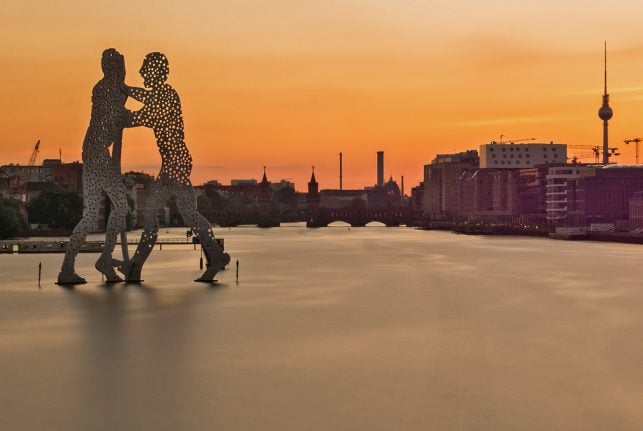1. Icke bin ein Berliner
This is an important one to get right from the very beginning. And if you have spent more than a few weeks in the capital, you probably already know it.
In the Berlin dialect you don’t say ich, you say icke.
So if John F. Kennedy had really wanted to impress the locals when he made his famous speech in 1963, he should have said “Icke bin Berlina.”
2. Das Leben ist kein Ponyhof – life is not a pony farm

A happy pony, but life can't always be like that. Photo: DPA
Whether it's the S-Bahn not working, the sun shining too hard or too little, or a dog owner not picking up after their pets – life can be hard in Berlin.
Or, as the Berliner will tell you: “Das Leben ist kein Ponyhof”.
Berliners don't put up with too much pettiness and this phrase means someone wants you to suck up whatever you're whining about. No time to live out your emotions – rather drown them in cigarette smoke and a bottle of Sterni beer.
3. It's a smoooth dialect
In Berlin you don't say 'au', you say 'oo'. And you don't say 'ei' you say 'ee'.
“Mach die Oogen zu, denn weeßte, wat dir jehört”, is something a Berlin local would say instead of the high German “Mach die Augen zu, denn weißt du, was dir gehört.”
The saying translates as: “Close your eyes, then you know what you own”, and you can use it for people who are overly possessive or materialistic.
4. Turning g's into j's and s's into t's
Another trick to make yourself sound like you're straight out of the Kiez is to always swap the letter 'g' for a 'j'.
If something is really far away in Berlin, you complain that it's “janz weit draußen”. And if you want to sound like a real pro, just use the abbreviation JWD.
Similarly, s's are often pronounced as t's. So “was” becomes “wat”, and “das” becomes “dit”.
5. Schrippen – bread rolls

Bread rolls in are called “Schrippen” in Berlin. Photo: DPA
“Dit sind Schrippen, keine Brötchen!”, (These are “Schrippen”, not “Brötchen”) the cashier lady will yell at you.
You may feel like you've made an honest effort asking for bread rolls in German at your local bakery, but when it comes to Berlin, good intentions aren't always good enough.
Try asking for “Schrippen”, (instead of the Hochdeustche Brötchen) when you come by next, and with time your local baker might come to recognize you as a human being.
6. Forget the grammar
In Berlin, people don't generally distinguish between the accusative and the dative. So this makes it easier for those Ausländer who struggle to do the same.
An old Berliner saying is that “der Belina sagt imma mir, ooch wenn et richtich is”, which means “a Berliner always says mir, even when it's right to do so.”
7. Die Auto – the car
“I've been learning German and it's been going well, but the 'der, die, das'… ugh, it's just killing me!”
Lucky for you, if you're living in the German capital, you'll realize that Berliners themselves haven't yet mastered the art of the article – mainly 'cause they couldn't care less.
“Ick war unterwegs mit die Auto von…” (I was in the car…), you'll hear the Berliner say idly. Despite the fact that it should be “das Auto”, try to refrain from being a grammar-pedant about it and engage with them in a conversation that's care-free and full of flaws.
8. Wegbier – beer for the road
When coming to Germany, it takes time to get used to the liberty of drinking in public, and to not constantly expect a cop to ambush you and throw you in jail.
But the longer you live here, the more you'll grow accustomed to one of Berlin's proudest traditions: the “Wegbier”.
Pop the top of your Sterni or Berliner Kindl bottle on your way to the park, a house party… or work even (?) and feel the freedom of a law that allows for drinking without thinking twice.
9. Heute nicht – not today

Sven Marquardt is the bouncer of the Berlin's infamous Berghain club. Photo: DPA
You've been standing in the queue for two hours, it's cold, everyone looks grumpy anyway, and then you hear the bouncer Sven's fateful “heute nicht”.
For years, the guardians of Berlin's infamous Berghain have used that phrase to turn down hopefuls at the club's door, thus inflicting lifelong scars on their egos and endowing them with a fancy for black clothing.
Nevertheless, you keep wanting to be part of the Berghain conspiracy – and until that's happened “heute nicht” haunts your dreams and keeps you coming back.
10. Biste in der S-Bahn geboren oder wat? – were you born on the S-Bahn or what?
“Bist du in der S-Bahn geboren oder wat?”, your Berliner housemate may shout after you, and you'll realize that he seriously just asked you if you were born on a public train.
Hopefully the answer is “no” – but that's not what he wanted to communicate to you anyway.
He wanted to tell you that you forgot to close the door behind you. Get it? Because if you were actually born on the S-Bahn, you were born relying on the doors closing automatically.
With Max Bringmann



 Please whitelist us to continue reading.
Please whitelist us to continue reading.
Member comments